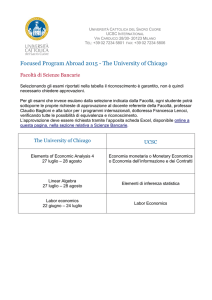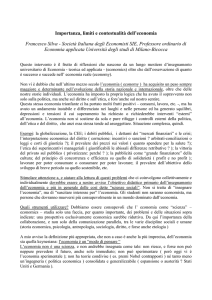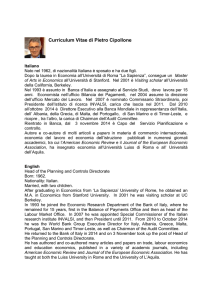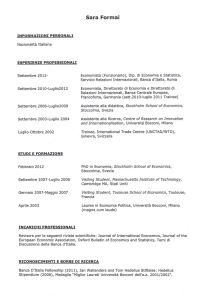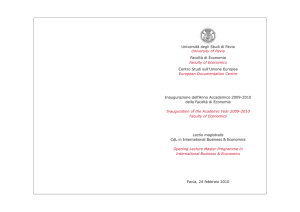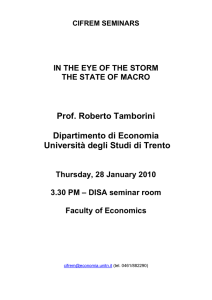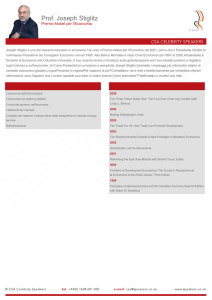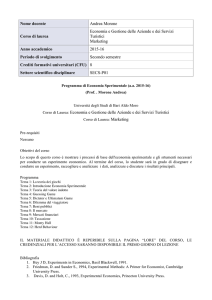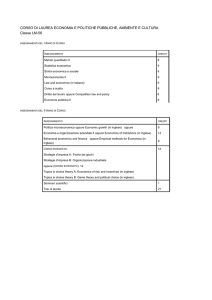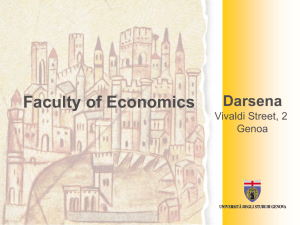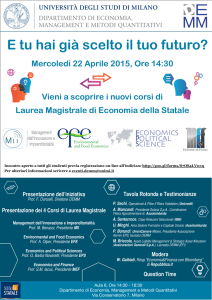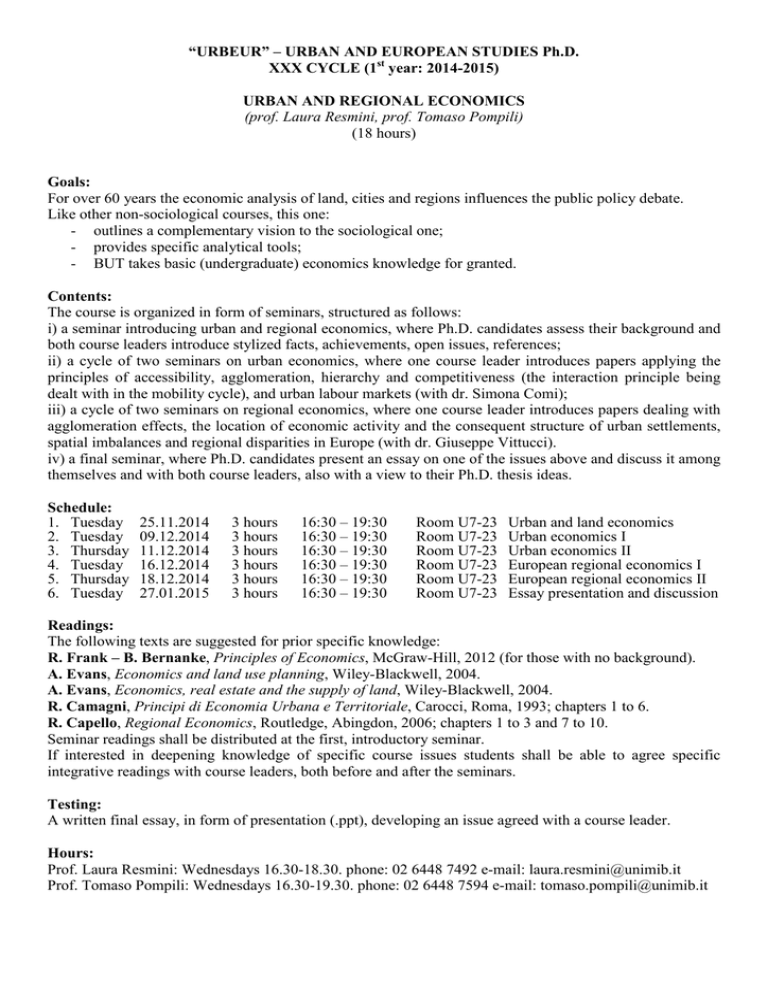
“URBEUR” – URBAN AND EUROPEAN STUDIES Ph.D.
XXX CYCLE (1st year: 2014-2015)
URBAN AND REGIONAL ECONOMICS
(prof. Laura Resmini, prof. Tomaso Pompili)
(18 hours)
Goals:
For over 60 years the economic analysis of land, cities and regions influences the public policy debate.
Like other non-sociological courses, this one:
- outlines a complementary vision to the sociological one;
- provides specific analytical tools;
- BUT takes basic (undergraduate) economics knowledge for granted.
Contents:
The course is organized in form of seminars, structured as follows:
i) a seminar introducing urban and regional economics, where Ph.D. candidates assess their background and
both course leaders introduce stylized facts, achievements, open issues, references;
ii) a cycle of two seminars on urban economics, where one course leader introduces papers applying the
principles of accessibility, agglomeration, hierarchy and competitiveness (the interaction principle being
dealt with in the mobility cycle), and urban labour markets (with dr. Simona Comi);
iii) a cycle of two seminars on regional economics, where one course leader introduces papers dealing with
agglomeration effects, the location of economic activity and the consequent structure of urban settlements,
spatial imbalances and regional disparities in Europe (with dr. Giuseppe Vittucci).
iv) a final seminar, where Ph.D. candidates present an essay on one of the issues above and discuss it among
themselves and with both course leaders, also with a view to their Ph.D. thesis ideas.
Schedule:
1. Tuesday
2. Tuesday
3. Thursday
4. Tuesday
5. Thursday
6. Tuesday
25.11.2014
09.12.2014
11.12.2014
16.12.2014
18.12.2014
27.01.2015
3 hours
3 hours
3 hours
3 hours
3 hours
3 hours
16:30 – 19:30
16:30 – 19:30
16:30 – 19:30
16:30 – 19:30
16:30 – 19:30
16:30 – 19:30
Room U7-23
Room U7-23
Room U7-23
Room U7-23
Room U7-23
Room U7-23
Urban and land economics
Urban economics I
Urban economics II
European regional economics I
European regional economics II
Essay presentation and discussion
Readings:
The following texts are suggested for prior specific knowledge:
R. Frank – B. Bernanke, Principles of Economics, McGraw-Hill, 2012 (for those with no background).
A. Evans, Economics and land use planning, Wiley-Blackwell, 2004.
A. Evans, Economics, real estate and the supply of land, Wiley-Blackwell, 2004.
R. Camagni, Principi di Economia Urbana e Territoriale, Carocci, Roma, 1993; chapters 1 to 6.
R. Capello, Regional Economics, Routledge, Abingdon, 2006; chapters 1 to 3 and 7 to 10.
Seminar readings shall be distributed at the first, introductory seminar.
If interested in deepening knowledge of specific course issues students shall be able to agree specific
integrative readings with course leaders, both before and after the seminars.
Testing:
A written final essay, in form of presentation (.ppt), developing an issue agreed with a course leader.
Hours:
Prof. Laura Resmini: Wednesdays 16.30-18.30. phone: 02 6448 7492 e-mail: [email protected]
Prof. Tomaso Pompili: Wednesdays 16.30-19.30. phone: 02 6448 7594 e-mail: [email protected]
DOTTORATO DI RICERCA STUDI URBANI ED EUROPEI (URBEUR)
XXX CICLO (1° anno: 2014-2015)
ECONOMIA DEL TERRITORIO
(prof. Tomaso Pompili, prof. Laura Resmini)
(18 ore)
Obiettivi:
Da più di 60 anni l’analisi economica del territorio orienta il dibattito sulle politiche pubbliche.
Come gli altri corsi disciplinari non sociologici di questo dottorato, questo corso:
- suggerisce una visione complementare a quella sociologica;
- fornisce specifici strumenti di analisi;
- MA da per scontata la preparazione economica di base (3, se non +2).
Contenuti:
Il corso è organizzato in forma di incontri seminariali, così strutturati:
i) un incontro di introduzione all’economia del territorio, in cui i dottorandi fanno il punto sulla propria
preparazione e entrambi i docenti presentano fatti stilizzati, risultati raggiunti, problemi aperti, bibliografia;
ii) un ciclo di due incontri sull’economia urbana, in cui un docente introduce lavori che applicano i principi
di accessibilità, agglomerazione, gerarchia, competitività (il principio di interazione è affrontato nel ciclo
sulla mobilità), e i mercati del lavoro urbani (con Simona Comi);
iii) un ciclo di due incontri sull’economia regionale, in cui un docente introduce lavori che trattano degli
effetti di agglomerazione, della localizzazione delle attività economiche e la conseguente struttura degli
insediamenti urbani, squilibri spaziali e disparità regionali in Europa (con Giuseppe Vittucci);
iv) un incontro conclusivo, in cui i dottorandi presentano una propria relazione su uno dei temi già trattati e
la discutono con i colleghi e con entrambi i docenti, anche in relazione a futuri interessi di tesi.
Calendario:
1. Tuesday
2. Tuesday
3. Thursday
4. Tuesday
5. Thursday
6. Tuesday
25.11.2014
09.12.2014
11.12.2014
16.12.2014
18.12.2014
27.01.2015
3 hours
3 hours
3 hours
3 hours
3 hours
3 hours
16:30 – 19:30
16:30 – 19:30
16:30 – 19:30
16:30 – 19:30
16:30 – 19:30
16:30 – 19:30
Room U7-23
Room U7-23
Room U7-23
Room U7-23
Room U7-23
Room U7-23
Urban and land economics
Urban economics I
Urban economics II
European regional economics I
European regional economics II
Essay presentation and discussion
Testi consigliati:
Si suggerisce di svolgere la preparazione iniziale sui seguenti testi:
R. Frank – B. Bernanke, Principi di Economia, McGraw-Hill, 2012 (candidati senza esami di economia).
A. Evans, Economia Urbana, Mulino, Bologna, 1992; capitoli da 2 a 11.
R. Camagni, Principi di Economia Urbana e Territoriale, Carocci, Roma, 1993; capitoli da 1 a 6.
R. Capello, Economia Regionale, Mulino, Bologna, 2004; capitoli da 1 a 3 e da 7 a 10.
Al primo incontro sarà distribuita la bibliografia degli incontri successivi.
Gli studenti interessati ad approfondire aspetti particolari del modulo potranno concordare con i docenti
specifiche letture integrative, sia preliminarmente sia successivamente agli incontri.
Verifica del profitto:
Una relazione scritta conclusiva, in forma di presentazione (.ppt), di approfondimento su tema concordato
con i docenti
Orario di ricevimento:
Prof. Laura Resmini: mercoledì ore 16.30-18.30. tel: 02 6448 7592 e-mail: [email protected]
Prof. Tomaso Pompili: mercoledì ore 16.30-19.30. tel: 02 6448 7594 e-mail: [email protected]

